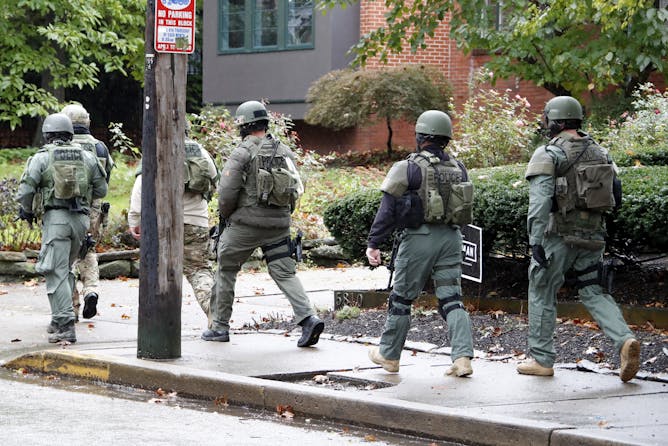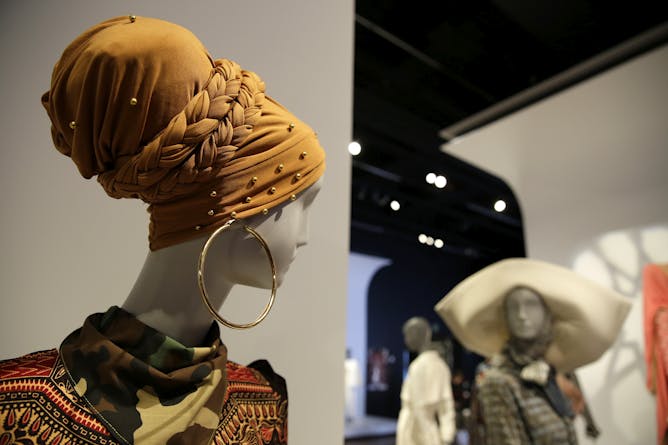|
|
|
Editor's note
|
|
We hope that each day you open this newsletter, you find stories that explain, inform and fascinate. My colleagues and I work hard to identify experts to share what they know with you – and we coach them in the art of public engagement.
If you value what we do, we hope you’ll support us (and for a limited time only, donations will be doubled through the generosity of NewsMatch).
Thank you in advance for your generosity.
Today, we have a look at how “fake news” became a common – and controversial – term during the 2016 election cycle, with accusations of misinformation, propaganda and outright lies. At the University of Michigan, a tool called the Iffy Quotient has been tracking “iffy” links on social media. The tool shows that questionable content has stayed level ahead of the midterms, but Twitter still seems to be
struggling to combat the problem.
We have two stories to help sort out next steps in the wake of the Pittsburgh shootings. Dr. Matthew Neal, a trauma surgeon at the University of Pittsburgh Medical Center who treated several victims, explains how training to stop bleeding saved lives – but how that isn’t enough. And, drawing on the work of Viktor Frankl, trauma psychologist Joan Cook writes about the challenge of making meaning from horrible life events.
San Francisco’s de Young Museum has opened the first major exhibition dedicated to Muslim fashions. Liz Bucar, who has studied how Muslim women dress for over a decade, writes how understanding their sartorial choices can help challenge many popular stereotypes.
|
Maria Balinska
Editor and Co-CEO
|

|
|
Top Stories
|

Social media misinformation rose significantly before the 2016 presidential election.
Georgejmclittle/shutterstock.com
Paul Resnick, University of Michigan
The Iffy Quotient measured misinformation on social media in the run-up to the recent elections. Facebook has gotten better at combating untrustworthy links, but Twitter still struggles.
|

A SWAT team arriving at Tree of Life synagogue, Oct. 27, 2018.
Gene J. Puskar/AP Photo
Matthew D. Neal, MD FACS, University of Pittsburgh
Quickly stopping the bleeding caused by wounds from assault weapons is critical. While 'Stop the Bleed' training has worked, a trauma surgeon asks: Wouldn't it be better to stop the need for it?
|

A headscarf and a wrap displayed in the exhibit ‘Contemporary Muslim Fashions’ at the de Young Museum in San Francisco.
AP Photo/Eric Risberg
Liz Bucar, Northeastern University
The de Young Museum of San Francisco recently opened an exhibit devoted to the Islamic fashion scene. Here's how Muslim women's fashions challenge popular stereotypes.
|
|
|
|
|
Environment + Energy
|
-
Rachael Garrett, Boston University
Brazil's president-elect wants to roll back environmental laws, saying they hurt rural growth. But preventing Amazonian deforestation has actually made farmland more productive.
-
Kelly Sims Gallagher, Tufts University
These policies, which are designed to slow the pace of climate change, don't have to cost taxpayers, and they do not appear to hinder economic growth.
|
|
Health + Medicine
|
-
Joan M. Cook, Yale University
The deaths of 11 worshippers at the Tree of Life synagogue filled people with sadness and fear. Transforming the grief into meaning is very difficult, a trauma psychologist writes, but ultimately healing.
-
Suan-Sin Foo, University of Southern California; Weiqiang Chen, University of Southern California
There is no vaccine or medicine for Zika. But researchers have identified factors in the blood that signal a fetus has Zika-related birth defects, helping mothers decide whether to terminate a pregnancy.
|
|
|
|
Politics + Society
|
-
Anthony W. Fontes, American University School of International Service
MS-13 is not the biggest or most violent gang in the US. But its grisly murders and Latino membership inflame Americans' anxiety about immigration. GOP campaign ads stoke those fears to attack Democrats.
-
James Binnall, California State University, Long Beach
In many places across the US, law prohibits people with felony convictions to serve on juries. Research puts the thinking behind these laws to the test.
|
|
Most Read on Site
|
-
Michael Downing, Tufts University
The original arguments Congress made for 'springing ahead' have been thoroughly debunked. So why are they still being used by legislators today?
-
Jennifer Ruef, University of Oregon
Many Americans feel anxiety or dread when it comes to math. A lot of that anxiety starts in childhood.
-
Vasudha Narayanan, University of Florida
Born Farrokh Bulsara, Mercury came from a Parsi family that practiced Zoroastrianism, a religion that influenced Judaism, Christianity and Islam.
|
|
|
|
| |
| |
|
|
|
|
|
|
|